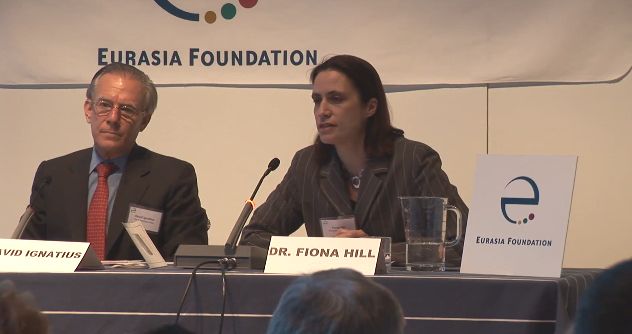Last June, ethnic riots broke out in Osh, Kyrgyzstan, between the Uzbeks and Kyrgyz, resulting in 400 deaths and more than a hundred thousand refugees fleeing across the border into Uzbekistan. When the army arrived, according to the New York Times, instead of keeping the peace, they fired on Uzbek houses. Human Rights groups say that a Kyrgyz government investigation of the conflict violated national and international law because suspects, often Uzbek, were denied due process, legal representation and medical attention.
"The initial phases of the unraveling violence and the response to it, showed that nobody really had a particularly good plan or a policy towards [Kyrgyzstan]," said Fiona Hill, director of the Center on the United States and Europe at the Brookings Institute. Hill spoke at a Eurasia Foundation panel discussion on Feb. 3 with Thomas de Waal of the Carnegie Endowment for International Peace. Washington Post columnist David Ignatius moderated the event.
"There's also been a sustained lack of international engagement in Central Asia," Hill said.
The conflicts in the Caucasus and Central Asia are similar, but play out differently based on the idiosyncrasies of each area, according to Hill. Torture and intimidation of journalists, activists and political dissidents are widespread. Freedom of religion, assembly and sexual orientation are often unprotected. Violent conflicts remain commonplace.
De Waal said that "the Caucasus suffers from being no one's backyard," and that the international community, including Russia, the United States, the United Nations and the European Union, had demonstrated no sense of urgency in quelling the conflict in Kyrgyzstan.
De Waal also noted that the international community has ignored the conflict over Nagorno-Karabakh, a disputed enclave technically within Azerbaijan but claimed by Armenia. A cease-fire has been in place since 1994 but with 20,000 troops on each side sometimes separated by less than 100 feet. De Waal said this dispute could soon turn violent without international intervention.
"I believe if this was the Balkans, Europe would have stepped up as it did in the Balkans, decided this was a priority [and that] these conflicts had to be resolved," de Waal said.
Hill and de Waal both said that the acts of local individuals and civil society groups produced progress in Kyrgyzstan and Nagorno-Karabakh, but a lack of resources, and the inability to promote human rights in the region without repercussions poses serious problems.
"We need to support those few brave individuals who are talking that narrative," de Waal said.
To learn more about these issues, visit Pulitzer Center journalist Philip Shishkin's reporting project on last year's unrest in Kyrgyzstan. Currently, Tom Parfitt is reporting for the Pulitzer Center on the growing guerilla war across the North Caucasus.
See Fiona Hill discuss Kyrgyzstan and the broader area:
See Thomas de Waal discuss the conflict over Nagorno-Karabakh and the region as a whole:
